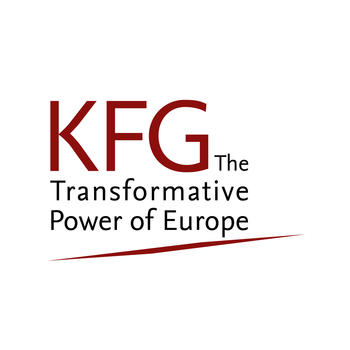Report: Authors’ Workshop –“European Integration Theory"
Nov 30, 2016
The authors’ workshop for the forthcoming third edition of “European Integration Theories” (to be published with Oxford University Press in 2018; 1st ed. Wiener and Diez 2003) took place on October 14–15 in the Harnackhaus of Max-Planck-Society and at the Freie Universität Berlin. The editors of the new edition, Antje Wiener (University of Hamburg), Tanja A. Börzel, and Thomas Risse, invited the authors to present and discuss their respective book chapters.
The authors’ workshop for the forthcoming third edition of “European Integration Theories” (to be published with Oxford University Press in 2018; 1st ed. Wiener and Diez 2003) took place on October 14–15 in the Harnackhaus of Max-Planck-Society and at the Freie Universität Berlin. The editors of the new edition, Antje Wiener (University of Hamburg), Tanja A. Börzel, and Thomas Risse, invited the authors to present and discuss their respective book chapters.
Following the successful format of the first two editions, the book offers an overview of all major theoretical approaches to European integration. Each author reflects on the development, achievements, and problems of his*her approach and demonstrates how their respective approach addresses major crises that are currently faced by the European Union (e.g. refugee policy, finance, and security). In the new edition, Tanja A. Börzel and Thomas Risse discuss the responses to current crises in the context of European Integration Theories as lessons learned. Apart from that, many new renowned scholars contribute to this book in order to shed light on new developments in European Integration Theories.
The workshop was organized in six sessions. In session I, Antje Wiener presented the introduction of the book, which sets off with Diez and Wiener’s original concept of the “Mosaic of Integration Theory”. The next chapter was “Federalism” by Daniel Keleman (Rutgers University). The editors were happy to welcome Daniel as a new author for the third edition. Session II started with feedback on the section “Neofunctionalism” by Arne Niemann (Mainz University) and Philippe C. Schmitter (European University Institute). Following this, the workshop participants dealt with “Liberal Intergovernmentalism”, written by Andrew Moravcsik (Princeton University) and Frank Schimmelfennig (ETH Zurich).
The third session began with a new contributor. Tanja A. Börzel, also one of the editors of the handbook, wrote about “Governance Approaches”. The topic of the next presentation was “The New Institutionalisms and European Integration” by Mark A. Pollack (Temple University).
After a short coffee break, Yvonne Galligan’s (Queen University Belfast) “Gender and European Integration” introduced the fourth session of the day. The authors of the following chapter, “Critical Political Economy”, Bastiaan van Apeldoorn (VU University Amsterdam) and Laura Horn (Roskilde University) are also newcomers to the third edition.
The second day of the workshop started off with the presentation of the section on “Social Constructivism and European Integration” written by Thomas Risse. Then, the chapter “Discursive Approaches” by another new contributor to the handbook, Ruth Wodak (Lancaster University), was taken up. Session V closed with a discussion of the section “Normative Theory and the EU: Between Contract and Community” written by two new authors, Richard Bellamy (University College London) and Joseph Lacey (Oxford University).
The final session revolved around the additional new chapter “Lessons Learned: European Integration Theories and Responses to Crises”, which was prepared and presented by Tanja Börzel and Thomas Risse. To round off the weekend of fruitful discussions, Antje Wiener concluded with her chapter “Taking Stock of Integration Theory”, offering a comparative perspective on the variety of approaches to European integration.
The editors were happy to have the opportunity to exchange views and insights on challenges and accomplishments of European integration with the authors, both old and new, and hope that the revised and updated edition of the book will be a valuable contribution to the current research.
Tanja A. Börzel, Antje Wiener, Thomas Risse
